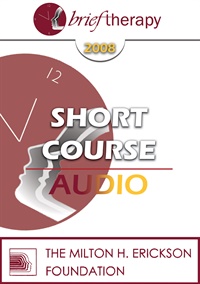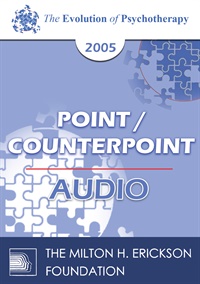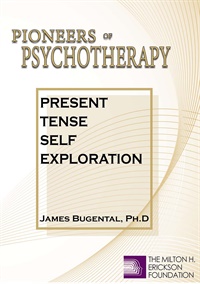
- Average Rating:
- Not yet rated
- Topic Areas:
- Short Courses | Children and Adolescent Therapy | Ericksonian Psychotherapy | Divorce | Psychotherapy | Ericksonian Hypnosis and Therapy Techniques
- Categories:
- Brief Therapy Conference | Brief Therapy Conference 2008
- Faculty:
- Maria Escalante de Smith, MA
- Duration:
- 1:25:05
- Format:
- Audio Only
- Original Program Date:
- Dec 11, 2008
- Short Description:
- Ericksonian psychotherapy emphasizes the utilization of people's resources. When working with children of divorced parents, I focus on strengths and keep in mind the Ericksonian interventions should be brief because children may get tired of being in therapy for a long time. In a case with two children, techniques including the use of toys will be discussed. How to make several brief interventions quickly while utilizing "toy co-therapists" in home assignments, and the combination of conversational trance with tasks will be emphasized. There also will be references to the importance of working with the family system.
- Price:
- $15.00 - Base Price

- Average Rating:
- Not yet rated
- Topic Areas:
- Workshops | Marriage | Sex and Sexuality | Brief Therapy | Couples Therapy | Infidelity | Divorce
- Categories:
- Brief Therapy Conference | Brief Therapy Conference 2006
- Faculty:
- Michele Weiner-Davis, LCSW
- Duration:
- 2:29:19
- Format:
- Audio Only
- Original Program Date:
- Dec 09, 2006
- Short Description:
- It is said that one in three couples experience a sexual desire gap, a difference that often wrecks havoc in every aspect of marital life. When you add to this the compelling statistic that one out of ten couples has a sexless marriage, it's easy to understand why so many couples are losing tough both literally and figuratively. A marriage that is void of healthy intimacy and physical connection risks divorce and/or infidelity. Learn what you can do to help couples bridge the desire gap and bring passion back to marriage, and also help couples heal from infidelity.
- Price:
- $15.00 - Base Price

- Average Rating:
- Not yet rated
- Topic Areas:
- Point/Counterpoint Sessions | Divorce | Couples Therapy | Marriage | Psychotherapy
- Categories:
- Evolution of Psychotherapy | Evolution of Psychotherapy 2005
- Faculty:
- John Gottman, PhD | Julie Gottman, PhD | Cloe Madanes, HDL, LIC
- Duration:
- 1 Hour 19 Minutes
- Format:
- Audio Only
- Original Program Date:
- Dec 08, 2005
- Short Description:
- The Gottmans will review research that shows that when the first baby arrives, up to 67% of couples go through a tragic deterioration in the quality of their relationship, which usually begins the cascade toward divorce. Their research outlines the consistent phenomena in this transition, and how the minority of marriages do manage to succeed in avoiding this tragedy. The Gottmans will describe a new approach to the problem and present the results of randomized clinical trial preventative intervention with one-year follow-up data on that intervention.
- Price:
- $15.00 - Base Price

- Average Rating:
- Not yet rated
- Topic Areas:
- Workshops | Attachment | Couples Therapy | Divorce | Marriage | Neuroscience
- Categories:
- Couples Conference | Couples Conference 2004
- Faculty:
- Helen E. Fisher, PhD
- Duration:
- 1:51:10
- Format:
- Audio Only
- Original Program Date:
- Mar 28, 2004
- Short Description:
- This workshop discusses the brain circuitry of the three primary mating emotions: lust, attraction and attachment. It traces the evolution of these emotion systems and illustrates how their neural circuitry contributes to contemporary patterns of marital harmony and discord including adultery; divorce; stalking behavior; clinical depression due to rejection in love; and other issues brought to contemporary couples therapy.
- Price:
- $15.00 - Base Price

- Average Rating:
- Not yet rated
- Topic Areas:
- Clinical Demonstrations | Psychotherapy | Divorce | Marriage
- Bundle:
- Pioneers of Psychotherapy Bundle
- Categories:
- Pioneers of Psychotherapy | Evolution of Psychotherapy | Evolution of Psychotherapy 2000
- Faculty:
- James Bugental, PhD
- Course Levels:
- Master Degree or Higher in Health-Related Field
- Duration:
- 01:38:00
- Format:
- Audio and Video
- Original Program Date:
- May 27, 2000
- Short Description:
- James Bugental (2000) explains the importance of focusing on immediate subjective experiences. Bugental works with Glenda who is experiencing deep guilt about an upcoming divorce. Bugental addresses questions from the audience. A second volunteer explores issues surrounding her recent career change. Bugental explains his approach and answers questions.
- Price:
- $59.00 - Base Price
Please wait ...

